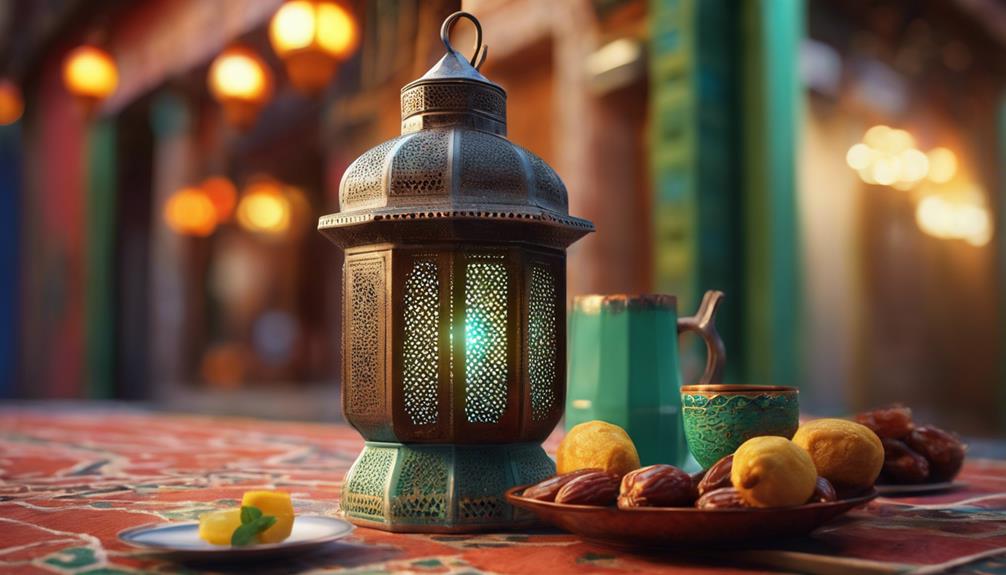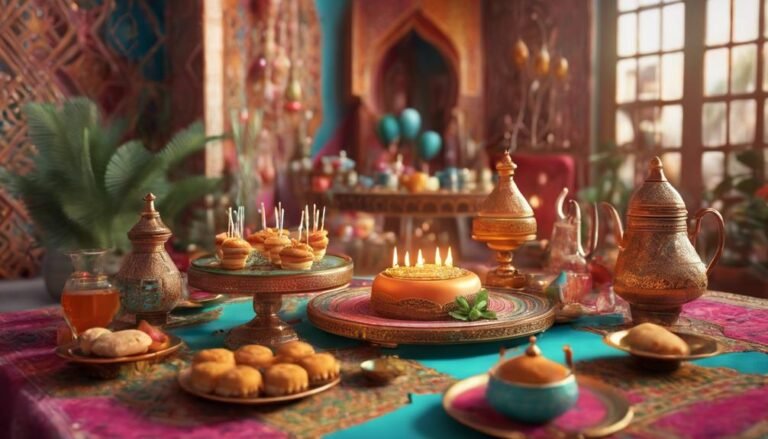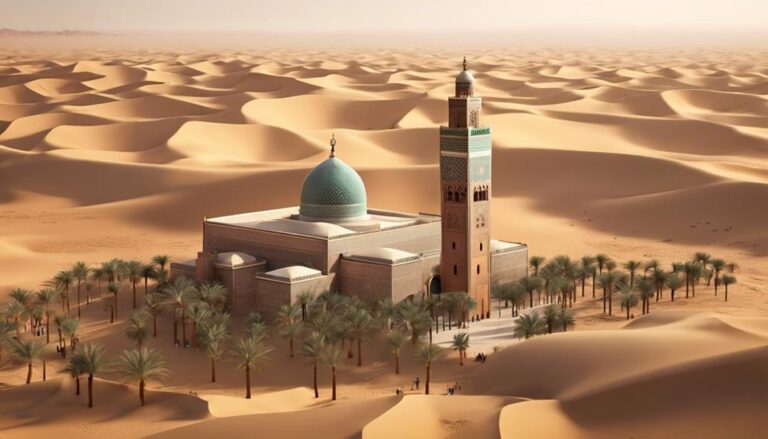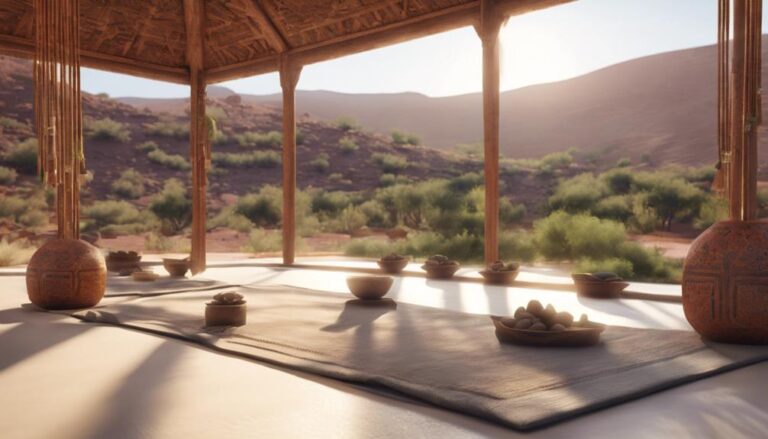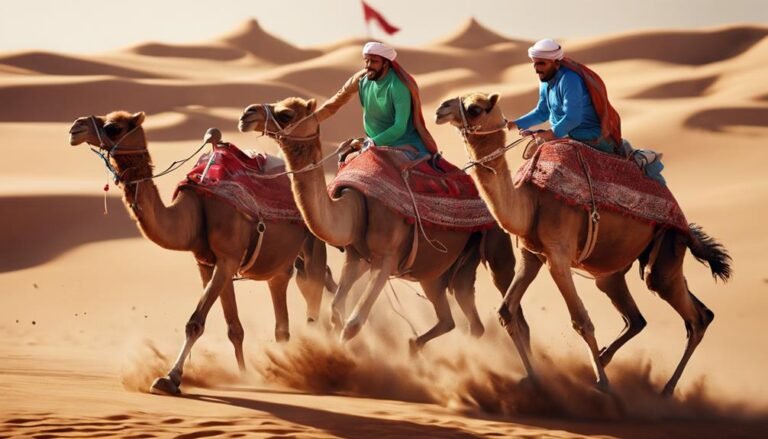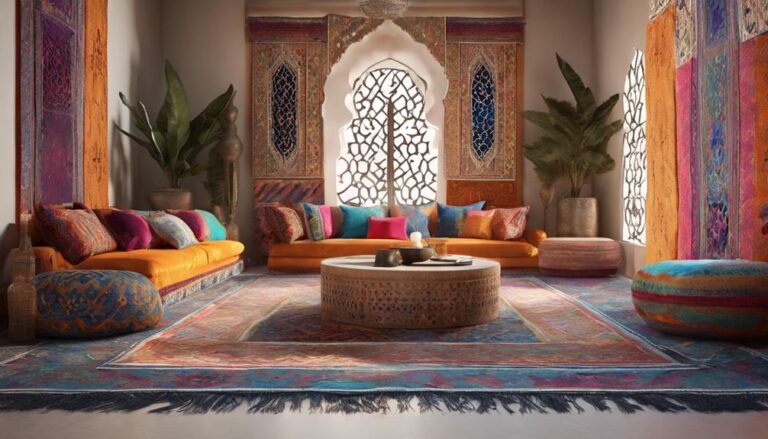Immerse yourself in the rich tapestry of Moroccan Ramadan traditions by partaking in fasting practices, savoring culinary delights such as Tagine and Chebakia, engaging in communal prayers, exploring vibrant markets, giving back through acts of charity, embracing the spirit of togetherness, and witnessing the grand Eid celebrations. Celebrating Ramadan in Morocco involves a blend of spiritual devotion, community engagement, and cultural richness that will leave you with unforgettable memories.
Key Takeaways
- Participate in communal prayers and Taraweeh rituals for a spiritual experience.
- Engage with locals at Ramadan markets for traditional sweets and dishes.
- Give back through charity like volunteering and donation drives.
- Wear new clothes during Eid, visit relatives, and join feasts.
- Experience festive atmosphere with decorations, music, and cultural activities.
Fasting Traditions During Ramadan
During the holy month of Ramadan in Morocco, fasting is observed from sunrise to sunset as a way to purify the soul and strengthen self-discipline. Fasting practices during Ramadan are deeply rooted in Islamic traditions and hold significant spiritual importance for Moroccans. The act of abstaining from food and drink from dawn to dusk isn't only a physical act but a spiritual endeavor that encourages self-reflection and devotion to Allah.
The fasting practices in Morocco aren't merely about refraining from consuming food and beverages but encompass a holistic approach towards self-improvement. It's a time for individuals to engage in spiritual reflections, seeking forgiveness, showing gratitude, and fostering a sense of empathy towards those less fortunate. Through fasting, Moroccans aim to cleanse their bodies and minds, purifying their intentions and drawing closer to their faith.
Savoring Special Moroccan Dishes
Savoring the rich tapestry of flavors in special Moroccan dishes brings a culinary journey that intertwines history, culture, and tradition on the vibrant palette of the Moroccan dining experience. Moroccan cuisine is renowned for its diverse and exquisite flavors, blending a mix of Arabic, Andalusian, and Berber influences. During Ramadan, indulging in these culinary delights is not just about satisfying hunger but also about experiencing cultural experiences through food. Below are some must-try Moroccan dishes during this holy month:
| Dish | Description | Key Ingredients |
|---|---|---|
| Tagine | Slow-cooked stew with meat and vegetables | Meat, vegetables, spices |
| Harira | Traditional soup with tomatoes and lentils | Tomatoes, lentils, herbs |
| Couscous | Steamed semolina served with vegetables | Semolina, vegetables |
| Pastilla | Sweet and savory pie with pigeon or chicken | Pigeon/chicken, almonds |
| Chebakia | Sesame and honey-coated fried cookies | Sesame seeds, honey |
Exploring these dishes not only tantalizes the taste buds but also provides a glimpse into the rich culinary and cultural heritage of Morocco.
Joining Communal Prayers and Taraweeh
Participating in communal prayers and Taraweeh rituals during Ramadan in Morocco immerses individuals in a deeply spiritual and communal experience. Attending mosque gatherings for Taraweeh prayers, which are performed in congregation after the Isha prayer, is a significant aspect of Ramadan observance in Morocco. These gatherings offer a sense of unity and shared devotion as Muslims come together to worship and seek spiritual reflection.
During Taraweeh prayers, the recitation of the Quran is often melodious and soothing, creating a tranquil atmosphere that fosters a deep connection with God. The extended nature of Taraweeh prayers, typically consisting of 8 to 20 units of prayer, allows for a prolonged spiritual experience that encourages self-reflection and supplication. Being part of these congregational prayers not only strengthens one's personal faith but also reinforces the communal bonds within the Muslim community.
Exploring Vibrant Ramadan Markets
Immerse yourself in the vibrant tapestry of Ramadan traditions by venturing into the bustling Ramadan markets of Morocco. These markets, also known as "souks," come alive during the holy month, offering a sensory overload of sights, sounds, and scents. As you navigate through the maze of stalls and vendors, you will find yourself on a shopping spree, surrounded by a plethora of goods ranging from traditional clothing and home decor to intricate handicrafts and aromatic spices.
| Experience | Emotion |
|---|---|
| Bustling crowds | Excitement |
| Colors of spices | Intrigue |
| Sounds of chatter | Enchantment |
| Aromas of food | Temptation |
Moreover, the markets are a treasure trove of culinary delights. Indulge in traditional Moroccan sweets like chebakia and sellou, or sample savory dishes such as harira soup and pastilla. The diverse array of food stalls will tempt your taste buds and provide an authentic gastronomic experience. Don't miss the opportunity to engage with locals, savor new flavors, and enrich your Ramadan journey through the vibrant markets of Morocco.
Giving Back Through Acts of Charity
Engaging in acts of charity during Ramadan in Morocco holds profound significance, reflecting the core values of compassion and community that define this holy month. As you seek to give back and make a positive impact, consider the following opportunities for volunteering and supporting those in need:
- Volunteering Opportunities: Many organizations and mosques in Morocco organize volunteering programs during Ramadan, providing you with a chance to contribute your time and efforts to various charitable initiatives.
- Donation Drives: Participate in donation drives organized by local charities or community centers. These drives often collect essential items such as food, clothing, and money to support disadvantaged families during the month of Ramadan.
- Community Kitchen Assistance: Offer your assistance at community kitchens that provide free meals to those in need. By volunteering to help prepare, serve, or clean up after meals, you can directly impact the lives of individuals facing food insecurity.
- Visit Orphanages and Elderly Homes: Spend time at orphanages or elderly homes, spreading joy and companionship to those who may feel lonely during Ramadan. Your presence and kindness can brighten their spirits and make a meaningful difference in their lives.
Embracing the Spirit of Togetherness
How can the essence of unity and solidarity be exemplified during the observance of Ramadan in Morocco? Embracing the spirit of togetherness is a fundamental aspect of Ramadan in Morocco, fostering community gatherings and enhancing family bonding. This holy month provides a unique opportunity for individuals to come together, strengthen relationships, and support one another in various ways.
To truly understand the significance of togetherness during Ramadan in Morocco, let's take a closer look at how community gatherings and family bonding play an essential role:
| Community Gatherings | Family Bonding | Impact |
|---|---|---|
| Taraweeh prayers at mosques bring people together | Iftar meals shared with extended family members | Strengthening social connections |
| Volunteering for charitable activities as a community | Cooking traditional dishes together | Promoting unity and harmony |
| Organizing neighborhood iftars and sharing resources | Visiting relatives and spending quality time | Fostering a sense of belonging |
Witnessing the Grand Eid Celebrations
As the culmination of Ramadan approaches, the grand Eid celebrations in Morocco captivate observers with their vibrant festivities and profound spiritual significance. The atmosphere during Eid in Morocco is filled with joy, unity, and reverence, making it a truly invigorating experience for all those who partake in the celebrations.
Here are some key aspects of witnessing the grand Eid celebrations in Morocco:
- Eid Feasts: Indulge in the delectable Moroccan dishes prepared during Eid, such as the traditional lamb tagine, sweet pastries like chebakia, and revitalizing mint tea.
- Festive Gatherings: Join in the lively gatherings that take place in homes, mosques, and public spaces, where families and friends come together to celebrate and exchange gifts.
- Spiritual Reflection: Take part in special prayers at mosques and reflect on the spiritual significance of Eid, which marks the end of Ramadan, a month of fasting, prayer, and introspection.
- Traditional Customs: Experience the rich cultural traditions of Morocco during Eid, including wearing new clothes, giving to charity, and visiting relatives to seek blessings and forgiveness.
Conclusion
To wrap up, celebrating Ramadan in Morocco offers a unique cultural experience filled with rich traditions and vibrant festivities. Embrace the spirit of togetherness and savor special Moroccan dishes while fasting during this holy month.
Join communal prayers, explore Ramadan markets, and give back through acts of charity to truly immerse yourself in the essence of Ramadan in Morocco. Witness the grand Eid celebrations as a culmination of this sacred time, cherishing the memories made with loved ones.
Ramadan in Morocco is truly an unforgettable experience.

The Editorial Team is a passionate group of Morocco enthusiasts dedicated to sharing the beauty, culture, and wonders of this captivating country. With diverse backgrounds and a deep love for travel, we strive to bring you engaging and informative content that inspires your Moroccan adventures. From uncovering hidden gems and sharing local insights to exploring mouthwatering cuisine and showcasing the vibrant lifestyle, our team is committed to providing you with valuable resources and exciting stories that enhance your exploration of Morocco. Join us on this journey as we celebrate the rich heritage and unforgettable experiences that make Morocco truly special.

